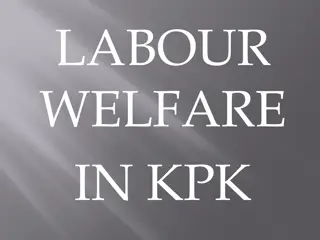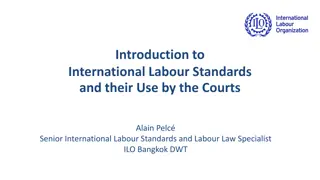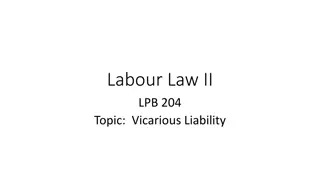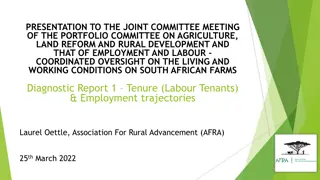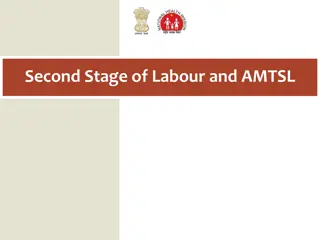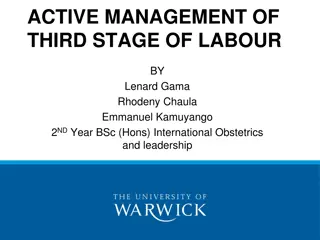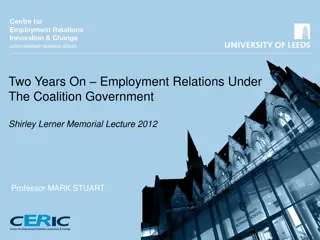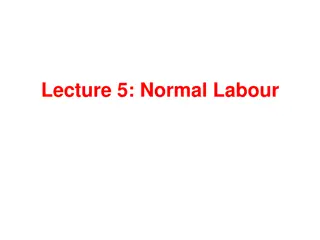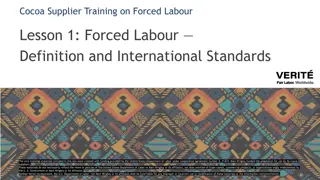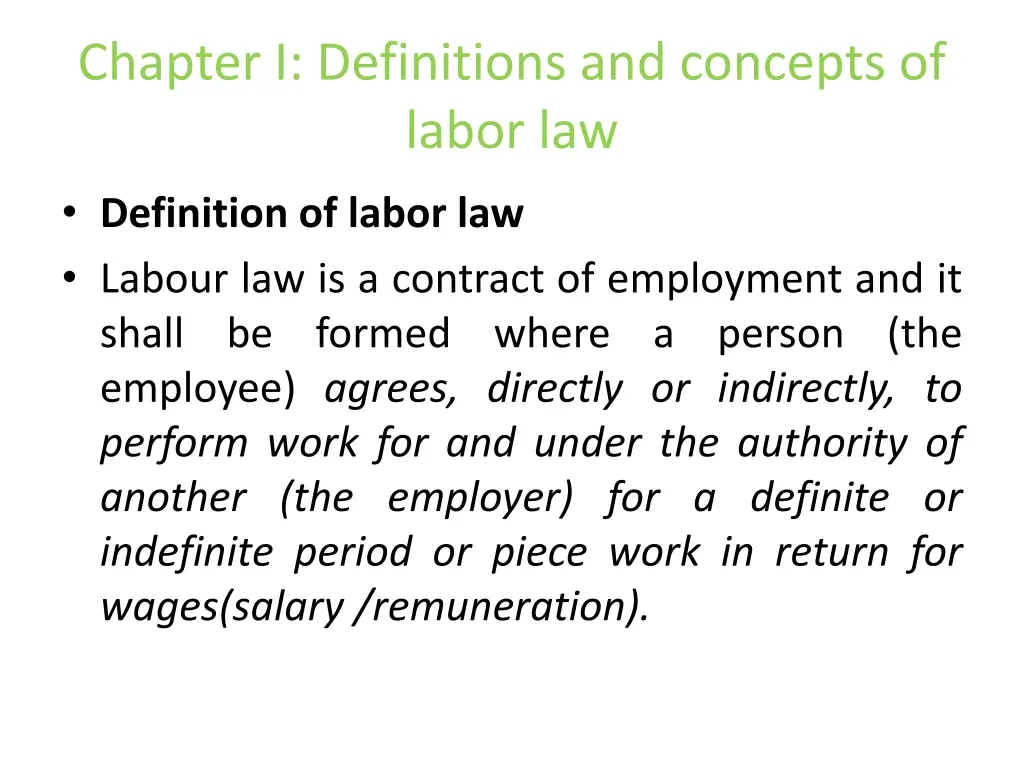
Concepts of Labor Law
Explore the foundational definitions and concepts of labor law, including the agreement between employer and employee, types of employment relations, and the distinction between sale of goods and employment contracts.
Download Presentation

Please find below an Image/Link to download the presentation.
The content on the website is provided AS IS for your information and personal use only. It may not be sold, licensed, or shared on other websites without obtaining consent from the author. If you encounter any issues during the download, it is possible that the publisher has removed the file from their server.
You are allowed to download the files provided on this website for personal or commercial use, subject to the condition that they are used lawfully. All files are the property of their respective owners.
The content on the website is provided AS IS for your information and personal use only. It may not be sold, licensed, or shared on other websites without obtaining consent from the author.
E N D
Presentation Transcript
Chapter I: Definitions and concepts of labor law Definition of labor law Labour law is a contract of employment and it shall be formed where employee) agrees, directly or indirectly, to perform work for and under the authority of another (the employer) for a definite or indefinite period or piece work in return for wages(salary /remuneration). a person (the
Elements of employment contract Some elements to examine with regard the above mentioned definition:- 1. Agreement employment contract is based on consent and voluntary engagement which automatically excludes forced labour from the ambit of employment relations. That means a person cannot be compelled to enter into an employment relations.
Types of employment relations A) Direct expression: An employment may be expressed directly whereby a person may directly or personally negotiate with his/her employer and conclude employment thereafter. a contract of
B)Indirect expression: the agreement may be indirect where by intermediaries(employment between the employer and the employee with a view to facilitating their relations. there is an as agencies)
2. Performance of work The employee is to perform work for of the employer . The employee will be required to render personal service. In this sense, the employee is committing him/her/self to render personal service for the benefit of the employer.
the differences between contract of sale of goods and contract of employment Contract of sale of goods is where the seller delivers something tangible to the buyer, whereas the employee is making his service available (i.e. something intangible) to the benefit of the employer. On the other had, the employee can not delegate his /her work to another person to render service in his/her behalf.
3. Under the authority of the employer The employee will be required to render the agreed service within the frame work of the instruction of the employer. The employer will direct, supervise and control the manner and performance of the employee. The employer will have the power to determine what work to be done; when to be done; where to be done; how to be done and with whom to be done.
However, that the authority granted to the employer over the employee is not meant and intended to establish a master and servant relationship. On the contrary, it is within the framework of the terms of the contract and the scope of the authority of the employer over the employee will be limited by law
the authority of the employer is different from an independent contractor An independent contractor performs work for the benefit of his/her client but in performing such work s/he is not under the strict direction of the client. The client in such cases is interested on the result and not on the manner how the result was achieved. For example, if a client seeks the service of a tailor to make him a three pieces suit, he will not have an interest where and how it is made so long as the agreed date and quality of the product is maintained.
But in case of an employer, he is not only interested on the result but also on the manner of arriving at such result.
4. Length of employment As regards to duration, a contract of employment could be entered into either for definite period (for six months, for one year etc), or for indefinite period (i.e. for the life of the company), or for a specific assignment (to unload sacks of grain from a truck). For example such contracts like marriage, in principle, is a life long engagement. This is not the case forcontract of employment.
5. Wage Contract of employment is not a pro bono service but, it is a service in return for wages. The employer will be expected and required to pay wage to the employee as s the employee is committing himself/herself to render personal service for the benefit and under the authority of the employer for the purpose of corresponding duty to perform.
Modes of payments of wages: The mode of payment for wage could be in cash or in kind though ordinarily payment is effected through cash. As regards to the interval of payment, it could be in daily, weekly, bi-monthly, monthly etc. END
Chapter- II- Some concepts about Individual Employment Relations Individual employment relation means is a contractual relation between an employee and his employer in their individual capacity.
Suspension is a situation where the employee will not be required to provide service to the employer and the employer will not be obligated to pay wages and other benefits to the employee. Nonetheless, their contractual engagement remains intact
Ways of suspension A contract of employment may be suspended for a variety of reasons: I. Voluntary arrangement of the parties; II. -Societal interest; III. -Due to reasons beyond the control of the employer; IV. -Due to disciplinary reaso
A. Voluntary Suspension: The employer and the employee may agree to suspend their contractual relation example, the employee may get an offer for a better pay for six months of employment. In such case he may request her employer to grant his leave without pay for six months. for sometime. For
continue Within the agreed six months, the employer will not pay the wages and other benefits to the employee, and the employee will not be required to render service for her employer. At the expiry of the six months period, however, the parties will be reinstated to their previous employment relation
B. Suspension for the benefit of Society: It is possible that the employee may be required to discharge national service (be it military service or otherwise).
C. Suspension due to reasons beyond the control of the employer: At times situations where there is a temporary cassation of the undertaking may occur. situations are economic reasons though there may also other reasons. For example, the Mararey sugar factory may be compelled to temporary suspend its operations fully or partially due to the over flow of the Shabelle River Most of these
Who shall have the authority to determine the suspension?? Suspension is not within the sole discretion of the employer. It is however, subject to revision by the Ministry of Labour. In order for the Ministry to determine whether the stated reason is adequate to suspend operation or not. However, the employer should give prior notice to the Ministry within reasonable time of period together suspension. with grounds of
If the Ministry determines there is sufficient ground for suspension, it will approve it and fix the duration of it If the Ministry determines that there is no adequate reason to withhold operation, it will order the resumption of the activities and payment of wage for the days on which the employees were suspended.
Failure to notify??? If the employer fails to inform the Ministry ofthe occurrence of a ground for suspension, it will not have valid ground operation. Furthermore it may be liable to fine for failure to notify to suspend its
D) Disciplinary Suspension: One of the prerogatives of an employer is to take disciplinary action against an employee. The employee on its part is required to render faithful service to the employer. Failure to observe such faithfulness may subject the employee to disciplinary action.
How to enforce disciplinary action??? The employer is expected to undertake the necessary investigation misconduct of the employee before taking any action. Until such time the investigation is completed, it may be appropriate to suspend the employee so that investigation could go smoothly. into alleged
E: Consequences of expiry of period of suspension: Normally as soon as the duration for suspension expires, the employee will be reinstated to his/her previous employment. But there may also be circumstances where suspension may be transformed into termination:
Continue For instance, in case of disciplinary suspension (e.g. if the outcome of the investigation shows a serious misconduct attributed to the employee), the contract of the suspended employee may be terminated.
Continue-------- In case of suspension for reasons beyond the control of the employer, suspension due to economic reasons,(e.g. if the Mararay factory cannot resume operation )suspension will be termination. particularly transformed into
Termination is where contract of employment is come to and end. A contract of employment may be terminated by law on the following grounds : Expiry of the period or on the completion of the work where the contract of employment is for a definite period or piece work; Death of the worker; Retirement of the worker in accordance with the relevant law; When the enterprise ceases operation permanently or due to bankruptcy or for any other cause; or Where the worker is unable to work due to partial or permanent incapacity.
The contract may be terminated by the employee on the following cases: Where the employer has committed against him any act contrary to his human dignity and morals.
In the case of imminent danger threatening the worker s safety or health, the employer, having been made aware of such danger, and the employer failed to act in time to avert the danger.
If the employer has repeatedly failed to fulfill his basic obligations towards the worker as prescribed under the law
A contract of employment may only be terminated by the employer on the following grounds:- Absence from work without good cause. Deceitful or fraudulent conduct in carrying out his duties. Misappropriation of the property or fund of the employer with intent to procure for himself or a third person undue enrichment
Responsibility for causing damage intentionally or through gross negligence to any property of the employer or to another property which is directly connected with the work of the employer.
Chapter III- Special categories of Employees A. Probationary employees: At the commencement of a employment, the employer is entitled to set a probationary period (i.e. trial period). contract of
The purpose of probation??? The purpose of probation is to test the suitability of the employee to a post in which he is intended to be assigned. Within the trial period, the employer is entitled to dismiss the employee with out any procedure if the employer convinced that the employee is unfit for the post.
B. Apprentice This is a situation through which the employer agrees to provide a person (i.e. the apprentice) complete and systematic training and the apprentice in return agrees to serve under the instruction given to carry out the training
How it beneficial to both parties??? The main interest of the employer in this relationship is not to obtain service it is rather to provide training to the apprentice. On the other hand, the main interest of the apprentice, is to acquire skill. .
An apprenticeship agreement is an appropriate route in transferring skill in those trades where skill could be acquired through learning by doing mechanism.
C. Young employees These are employees between the age of 14 and 18. Legally speaking, persons below the age of 18 are minors and due to this status they are not allowed to enter into juridical acts personally.
D. Female employees: It is well known that women have special and irreplaceable reproductive role in society. Because of this, their biological make up requires special care and attention
How to protect female employees The law tries to regulate the situation of female employees from two angles:- The first type of regulation is providing flat protection available to all females by virtue of being female. The other type of regulation is providing special provisions for females under particular circumstances such as pregnancy and maternity
E. Employees with disability:- Disability meanspeople with physical and mental disabilities Studies have verified that over 600 million people worldwide have a physical, sensory, intellectual or mental impairment in one form or another. This equals approximately 10% of the world s population.
Reasonable accommodation to disabilities Disability can sometimes affect an individual s ability to carry out a job in the usual or accustomed way.
Examples of a reasonable accommodation:- an adjusted office chair (for a person with a back impairment), adapted working hours (e.g. for a person with a medical condition requiring frequent rest-breaks), a computer keyboard with a Braille reader (for a blind person), And the assignment of a job coach (e.g. for a person with an intellectual or mental health disability
Chapter IV- Legally stipulated minimum working conditions a. Minimum Wage Many jurisdictions have succeeded in prescribing minimum hourly/monthly wages to employees working within their territory. Others leave this issue to the contracting parties.
b. Employment security(job security) Another item for minimum working condition is trying to protect the employee from unjustified dismissal. Employment, for a worker, is not only a source of revenue but also
c. Normal Working hours By normal working hours, we mean those periods in a day or in a week which employee regularly renders service to the benefit of his employer.
d. Safe and Healthy working conditions It is well known that industrial activities are full of risks. Risks could be either to life, health, property or the environment or to all. The Risk may express itself in the form of accident, occupational disease or environmental pollution
E. Preventive measures At the level of prevention, the employer is bound to prevent preventable risks. For this purpose, it is required to provide safety equipments and train how and when to make use of them . Nevertheless, it is worth noting that the employee has also a corresponding duty at the level of prevention.


